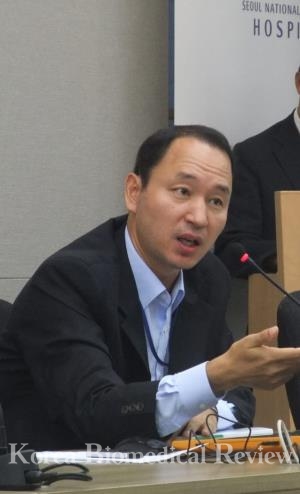With continued reports of human rights violations against trainee physicians and nurses, the Ministry of Health and Welfare said it would take stern measures such as a law revision to deal with wrongdoings in hospitals.
“The government has a firm stance on strictly handling the issue of human rights of medical residents and nurses,” Kwak Soon-heon, director of the ministry’s Healthcare Resource Policy Division, told reporters on Wednesday. “Then, the government will come up with additional measures to protect the rights of other medical staffs, step by step.”
The ministry is investigating the Sacred Medical Foundation for coercing nurses at its affiliated Hallym University Sacred Heart Hospital to perform a suggestive dance in revealing clothes during a sports event in October. After the probe, the government plans to impose due punishment depending on the results of the probe.

The government is also seeking stiff penalties, such as depriving a medical professor of the status of the “supervising medical specialist,” if the professor is found to have physically attacked or sexually molested a trainee doctor.
“We ordered a public health center, having jurisdiction over the Hallym University Sacred Heart Hospital, to conduct a fact-finding investigation. We will find out whether it illegally dispatched a nurse from the intensive care unit to a general ward to tend to the medical foundation’s president, as news reports revealed,” Kwak said. “We will also probe whether the hospital breached the Medical Service Act such as seeking illegal reimbursements, fabricating medical records, and forcing nurses to write prescriptions instead of physicians.”
If investigation results confirm the hospital’s wrongdoings, the authorities will seek redemption of the illegal reimbursement and impose penalty and fine, he added.
The government is also working out various measures to tackle widespread violence against medical residents.
Kwak said the ministry would review canceling a training course in case a trainee physician suffers a physical attack or sexual violence. “The issue of physical attacks on residents is so massive that the government will even seek a law revision through the National Assembly, if necessary,” he said.
The government plans to revise a law to allow a victim trainee physician to move to another training hospital so that he or she can continue receiving medical training.
“The government is reviewing whether to transfer the hospital head’s authority -- to allow a trainee physician to move to another hospital – to the Health and Welfare Ministry’s committee for assessment of training conditions,” Kwak said. “If a victim resident directly applies to the committee, the move to another training hospital will be easier than now.”
Kwak noted that the law revision would be possible through revising the Act for the Improvement of Training Conditions and Status of Medical Residents, as motioned by Rep. Choi Do-ja of the opposition People’s Party in June.
The law states that minister of health and welfare can order a training hospital’s head to take necessary measures when a trainee physician needs to move to another hospital due to a sex crime, physical violence, or verbal abuse.

